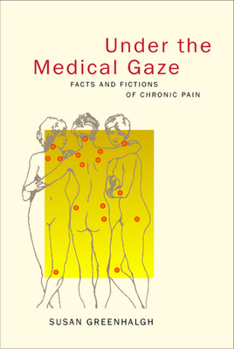Under the Medical Gaze: Facts and Fictions of Chronic Pain
This compelling account of the author's experience with a chronic pain disorder and subsequent interaction with the American health care system goes to the heart of the workings of power and culture... This description may be from another edition of this product.
Format:Paperback
Language:English
ISBN:0520223985
ISBN13:9780520223981
Release Date:May 2001
Publisher:University of California Press
Length:383 Pages
Weight:1.15 lbs.
Dimensions:0.8" x 6.0" x 9.1"
Related Subjects
Administration & Medicine Economics Administration & Policy Anthropology Chronic Fatigue Syndrome & Fibromyalgia Chronic Pain Clinical Diseases & Physical Ailments Health Care Delivery Medical Medical Books Pain Management Pain Medicine Pharmacology Politics & Social Sciences Social SciencesCustomer Reviews
1 rating
Doctor patient relationship put under a penentrating "gaze"
Published by Thriftbooks.com User , 22 years ago
Susan Greenhalgh has written a fascinating account of how the process of medical diagnosis and treatment can go horribly astray despite the best intentions of both the doctor and the patient. Greenhalgh had suffered for years from a painful arthritic condition. Upon moving to California she found her condition getting much worse. Unsatisfied with the care she was getting from the local rheumatologist, care that addressed the flare-ups of pain but not the cause of the pain, she sought help from a rheumatologist some distance away who had been recommended to her by a friend. At her first visit, this rheumatologist then misdiagnosed her with fibromyalgia, among other conditions. The treatments he then recommended caused side effects, which mimicked fibromyalgia and compounded his initial misdiagnosis. He treated the side effects that included severe headaches, neck and back pain, cognitive difficulties, vision problems and severe depression, as further evidence of fibromyalgia. The result was that Greenhalgh became increasingly sick, with her life and livelihood placed in jeopardy. Her book is an account of the 8 disastrous months she spent in this rheumatologist's care, until she finally realized that she needed to seek another opinion. During her time in treatment she had taken scrupulous notes of all her visits and telephone calls with the doctor as well as the progress of her symptoms. She took these notes to understand and track her treatment, not with the intention of writing a book. They simply reflect the lifelong habits of a conscientious anthropologist. Her book uses these notes as the basis of a careful analysis of the assumptions underlying medical diagnosis, and how these assumptions, along with the rhetoric and practices of medicine, can have disastrous results, especially when applied to chronic pain conditions, rather then acute illnesses. Her analysis, far from simply criticizing the doctor for a combination of misdiagnosis and a disinclination to really hear what she was saying about how she was feeling, also critically analyzes her own role in the relationship. Both she and the doctor were active partners in creating a doctor patient relationship, which worked against the best interests of the patient (and the best interests of the doctor, assuming his intention truly was to help). In becoming aware of how the doctor patient relationship can work against the best interest of patients, patients and doctors can potentially both become active participants in creating doctor patient partnerships that honor the complementary knowledge that doctors and patients can bring to medical encounters. Such doctor patient relationships are counter to the medical discourse, which is the discourse of science, in which the doctor is all knowing and the patient the quiet recipient of that knowledge. Doctors and patients are both socialized to accept this hierarchy of all knowing doctor and all believing patient and both doctor and patient must becom





